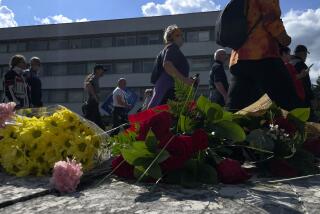TURMOIL IN THE EAST BLOC : Rumors of Impending Coup and ‘Dark Forces’ Make Prague Nervous : Czechoslovakia: The coup report is laid to an ‘entirely irresponsible campaign’ attempting ‘to create panic.’ Still, some strange things are happening . . . .
- Share via
PRAGUE, Czechoslovakia — For more than a week, this has been a city in celebration, but in recent days the festivities have taken on a strong undertone of nervousness.
On Monday, for example, the Ministry of Defense felt compelled to issue a nationally broadcast statement denying widespread rumors of an impending coup.
An “entirely irresponsible leaflet campaign,” centering on the provincial city of Brno, has talked about a coup in an attempt “to create panic,” Defense Ministry spokesman Col. Stanislav Pohorel said. “The army command strongly dissociates itself from such actions and rejects the accusation,” he added.
At the same time, Civic Forum opposition leader and presidential candidate Vaclav Havel broadcast a statement warning of strange “emissaries” who have visited military units. He urged soldiers to listen to their commanders and not these “various messengers, whatever their motives.”
Other rumors involve tales of mysterious car accidents, missing persons and assaults on a young man who was allegedly accosted by three men in civilian clothes, beaten and left on a railroad track.
Most of the rumors are unverifiable, but they are widely believed. Together with the lingering scars from the brutal suppression of the 1968 reform movement here, the rumors have had a very real effect on political developments.
Involved is what Czechoslovaks refer to--often in hushed tones--as “temne sily,” the dark forces. And there are enough verifiable incidents to make clear that the continued presence of “dark forces” is not just a product of fevered imaginations.
Shortly after 4 a.m. Monday morning, for example, a Western newspaper correspondent here was awakened by the sound of someone opening his hotel room door with a key. A few minutes later, an unidentified man walked in, only to run out when the reporter asked what he was doing. American Embassy officials say that a U.S. diplomat here recently had the same experience.
“We can’t prove it’s the secret police, but we assume so,” a diplomat said.
Other Western diplomats have reported returning to their homes at the end of the day to find one or two pieces of furniture moved, just enough to make the intrusion noticeable. Such incidents have declined somewhat in recent weeks, but they have not disappeared.
Over the last four weeks, the opposition has succeeded in removing from power the people for whose benefit the Czechoslovak police state was run. But the state apparatus itself remains.
Leaders of the democracy movement concede that the new government, in office only one week, has not yet been able to bring under control the nation’s security forces--most importantly the Statnibezbecnost, or STB, as the secret police here are known.
Student demonstrators have taken “Abolish the STB” as one of their favorite slogans. But “we cannot push that institution too fast,” cautions Jan Carnogursky, a first deputy prime minister and the senior non-Communist member of the government.
And until the STB and similar bodies are brought under the control of the law, Carnogursky and others say, an open election campaign remains impossible.
As a result, Civic Forum and its allies have had to adopt undemocratic tactics to ensure the transformation to democracy.
The new government, for example, was hammered out in deals worked out behind closed doors and pushed into power by the strength of massive street demonstrations that intimidated the old Communist regime into resigning. There is little doubt that the government more closely reflects the popular will than the Communists did. But there is also no claim that the government was freely elected.
Today, student leaders plan to use the same pressure tactics, running special trains to bring thousands of students here from around the country to demonstrate in front of the Federal Assembly, the Parliament, to force deputies to vote soon to make Havel president.
Opposition leaders say they have no choice, given the continued strength of the other side. “If we adhered strictly to the forms of the constitution, we could be wiped out,” Carnogursky said in a recent conversation.
Civic Forum leaders, most notably Havel himself, devote considerable time in their speeches to urging their listeners not be be afraid.
But fear--or at least concern--was a major factor in the negotiations leading to the formation of the new government, Civic Forum officials say. A prime worry was how to devise a way to control the police that would not lead its forces to “mutiny.”
The resulting compromise has left the country in a strange limbo. Carnogursky and Prime Minister Marian Calfa oversee the Interior Ministry, but no minister has been appointed to head that ministry, which controls the security forces.
Prague’s main squares and hotel lobbies still are ringed with surveillance cameras, but no one is sure whether they are still monitored.
State television has broadcast several reports about new restrictions being placed on telephone tapping, but it has also shown Interior Ministry officials defending the practice.
Officially, mail is no longer being opened. But in practice, Czechoslovaks who want to send political material to relatives in the West still often ask travelers to take the sparcels out of the country for them.
“We are happy,” said one young Czech woman after making such a request of an American visitor. “But we remember our past. We cannot afford to be euphoric.”
More to Read
Sign up for Essential California
The most important California stories and recommendations in your inbox every morning.
You may occasionally receive promotional content from the Los Angeles Times.














